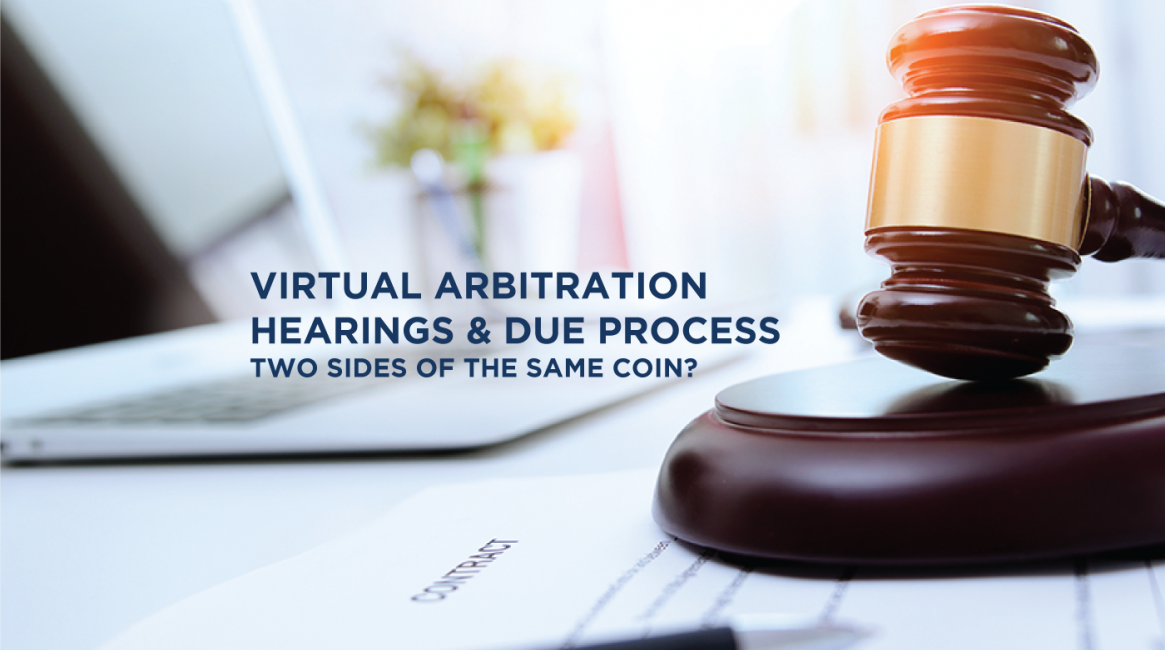In our latest insight, Dr. Aline Tanielian Fadel explores the validity of virtual hearings under Lebanese Laws. Look into her analysis of the recent boom of virtual and paperless arbitration hearings, as published in the 67th Issue of Legal Agenda.
Dr. Tanielian is a Partner at our Beirut offices and Head of our Arbitration Practice. She is a listed arbitrator under VIAC, ADGM, ICC, as well as a member of the ICC Arab Arbitration Group and AbitralWoman and a lecturer of Commercial Law at the Saint Joseph University of Beirut.
“Nothing is lost, nothing is created, everything is transformed” (Elementary Treatise on Chemistry, Antoine-Laurent de Lavoisier).
Virtual arbitration and paperless arbitration have been promoted by arbitration institutions and used by many arbitrators since the early two-thousands.
Nevertheless, by making such use a necessity due to travel bans and social distancing measures, the current Covid-19 pandemic has contributed to the development of numerous platforms and tools that can be used for virtual and paperless arbitrations, encouraging the most reluctant arbitrators, counsels and parties to “give it a try”. The results have been so positive that the recurrent question nowadays is whether virtual arbitration hearings and paperless arbitration should become the norm post-Covid-19 era, to make arbitrations time and cost-effective and at the same time environment friendly, as far as less travelling and less use of paper are concerned.
Having to convince many parties and their counsels to agree to hold hearings virtually, and keeping in mind the need to shield their award from annulment and secure recognition and enforcement for it, arbitrators are striving to ensure that virtual hearings comply with due process requirements.
Authors and practitioners have already described in numerous articles (Offline or Online? Virtual Hearings or ODR?) http://arbitrationblog.kluwerarbitration.com/2020/04/26/offline–or–online–virtualhearings–or-odr/?doing_wp_cron=1594785424.7685549259185791015625;
What if Parties Don’t Agree on a Virtual Hearing? A Pandemic Pathway, https://globalarbitrationreview.com/article/1226483/what–if–parties–dont–agree–on–avirtual–hearing–a–pandemic–pathway;
Virtual Hearings- the New Normal, https://globalarbitrationreview.com/article/1222421/virtual–hearings–%E2%80%93the–new–normal;
Arbitration Unplugged Series- Virtual Hearing: Present or Future?, http://arbitrationblog.kluwerarbitration.com/2020/05/23/arbitration–unpluggedseries–virtual–hearing–present–or–future/?doing_wp_cron=1592975397.8859529495239257812500;
Do Virtual Hearings Without Parties’ Agreement Contravene Due Process? The View from Singapore, http://arbitrationblog.kluwerarbitration.com/2020/06/20/do–virtual–hearingswithout–parties–agreement–contravene–due–process–the–view–fromsingapore/?doing_wp_cron=1593397834.5463769435882568359375) and webinars best practices in this regard, focusing mainly on the importance of giving an equal time and opportunity to all the parties to present their case despite potential internet connection problems and time-zone differences, in addition to organizing and supervising witness and expert testimony in order to avoid the tampering with such oral evidence by the parties.
This post focuses on two other aspects of due process that seem to be two sides of the same coin:
- Is the virtual arbitration hearings’ compliance with due process requirements a sufficient basis to disregard parties’ objections to virtual hearings? and
- Can virtual arbitration hearings prevent delays and consequently denials of justice, not only in arbitration proceedings but also for cases before the state courts, ensuring by the same way compliance with due process?
Compliance with Due Process: a Sufficient Basis to Disregard Objections to Virtual Hearings?
The arbitrators’ approach to ensure virtual arbitration hearings’ compliance with due process requirements is consistent with the decisions of the European Court of Human Rights.
Indeed, the Court rendered several decisions pertaining to lawsuits involving the Italian Mafia in which a party challenged the compliance of virtual hearings by video conferencing held by Italian courts with article 6 of the European Convention on Human Rights (“ECHR”): it considered that hearings held by video conferencing were in principle compliant with the right to due process of article 6 ECHR, provided that the use and features of video conferencing themselves ensure due process (Visioconférence et Droit à un Procès Equitable, RDLF 2011, chron. n°08, citing: ECtHR, 5/10/2006, n°45106/04, Marcello Viola v. Italy ; ECtHR, 27/11/2007, n°35795/02, Asciutto v. Italy ; ECtHR, 27/11/2007, n°58295/00, Zagaria v. Italy, Laure Milano).
Since article 6 ECHR’s requirements for a “fair and public hearing within a reasonable time by an independent and impartial tribunal established by law” are equally required by articles 8 and 10 combined of the Universal Declaration of Human Rights, we believe that, as long as the arbitrators have the required powers to manage the case, no state court (even outside of the Council of Europe) should annul or refuse enforcement or recognition of an arbitral award rendered on the basis of virtual hearings in the absence of an explicit provision prohibiting virtual hearings, unless these hearings have violated due process requirements.
Consequently, parties’ various objections to such hearings should be handled by the arbitral tribunal as follows:
- If both (or all) parties object to virtual hearings, they would not participate in such hearings and it would therefore be practically impossible for the arbitral tribunal to ensure compliance with due process requirements. In this case, the tribunal cannot disregard the objection, because holding the hearing virtually without the parties would violate due process, in addition to its clear violation of the consensual nature of arbitration.
- If only one party (or some but not all parties in multiparty arbitrations) objects to virtual hearings, the arbitral tribunal should consider whether such objection relates to that party’s difficulty to access or use the virtual hearing platform and, in the affirmative, make proper arrangements to overcome such difficulty, such as: an alternative platform, the availability of a venue with better internet connection or appropriate equipment, other arrangements to take into account time-zone differences, etc.
- If the objecting party(ies) refuses to conduct the hearings virtually in the absence of any hurdle to meet due process requirements or despite the measures taken by the arbitral tribunal to overcome such hurdle, the tribunal should disregard the objection and proceed unless:
- there is a mandatory explicit provision in the applicable lex loci arbitri imposing hearings by physical appearance,
- the governing procedural rules impose hearings by physical appearance and there is no mandatory provision to the contrary in the lex loci arbitri, or
- the lex loci arbitri contain a non-mandatory provision of physical appearance hearings while the governing procedural rules are silent on the matter.
Therefore, if both the applicable lex loci arbitri and the procedural rules are silent on this matter as it is often the case, virtual hearings should be deemed validly held if the due process requirements are met.
Having established how due process saves virtual arbitration hearings from objections and annulment, we can now examine the other side of the coin, i.e., how virtual arbitration hearings may save due process by avoiding a denial of justice.
Virtual Hearings: an Efficient Tool to Ensure Compliance with Due Process by Avoiding Unreasonable Delays?
“Justice delayed is justice denied”: it is well-established that due process requires the resolution of disputes within a reasonable time. Therefore, when travel bans and social distancing measures prevent hearings by physical appearance and the dispute cannot be resolved solely on the documents submitted by the parties, whether because the parties or arbitrators insist on holding hearings or because the nature of the dispute requires hearings, virtual hearings become the only way to proceed and ensure the dispute’s resolution within a reasonable timeframe in order to avoid a denial of justice, whether in arbitration or before the state courts.
But what about countries where virtual hearings are prohibited or not logistically possible (whether for lack of equipment or internet connection, power outage, etc.) before the state courts?
For instance, one of these countries, Lebanon, is suffering from a significant disruption of the hearings before its courts since the mass demonstrations of October 2019 followed by the mandatory lockdowns due to Covid-19, amidst a surge of lawsuits in relation to debt recovery and lay offs due to the economic crisis. Despite the efforts undertaken by the Bar Associations, the High Judicial Council and the Lebanese Ministry of Justice to minimize the need to hold hearings and secure funding for the digitalization of the courts and their logistical needs, in addition to the initiatives of some judges to resort to video conferencing to conduct hearings, there are numerous hearings postponed repeatedly since October 2019.
Consequently, virtual arbitration proceedings can be promoted as a valuable alternative in countries facing challenges similar to Lebanon, in order to help the state courts reduce their heavy backlog and focus on disputes that are not arbitrable by nature, avoiding unreasonable delays in the resolution of disputes and therefore, ensuring compliance of the courts themselves with due process.
By doing so, virtual hearings may perhaps initiate a “transformation” in the perception of arbitration as “an exceptional way to resolve disputes” (e.g., and as repeatedly stated by the Egyptian courts and the Dubai courts of the United Arab
Emirates: Egyptian Court of Cassation, recourse no. 12476 of the judicial year 87 dated
16/9/2018 -in Arabic https://www.cc.gov.eg/judgment_single?id=111392466&&ja=265038, and Dubai Court of Cassation, recourse no. 18/2019, decision dated 21/4/2019- in Arabic https://www.dc.gov.ae/PublicServices/VerdictPreview.aspx?OpenedCaseMainType=0& OpenedLitigationStage=5&CaseYear=2019&CaseSerialNumber=18&CaseSubtypeCode=4 45&Keyword=&DecisionNumber=6&lang=&OpenedPageNumber=0), which perception has been relied upon in some countries and/or by some judges that are not “arbitrationfriendly” to construe arbitration restrictively.






